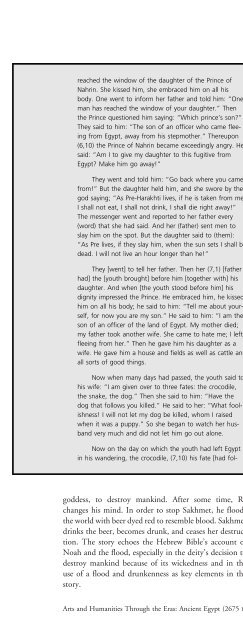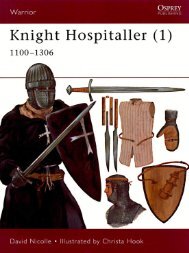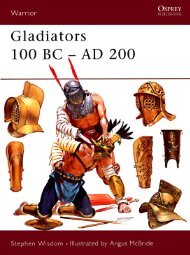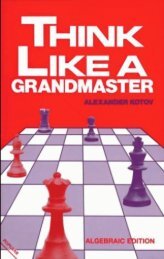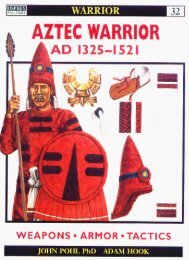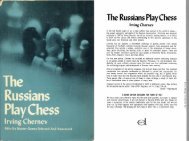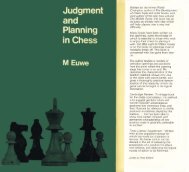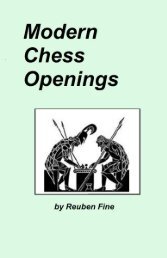Through the Eras
Edward Bleiberg ed., Ancient Egypt (2675-332 ... - The Fellowship
Edward Bleiberg ed., Ancient Egypt (2675-332 ... - The Fellowship
You also want an ePaper? Increase the reach of your titles
YUMPU automatically turns print PDFs into web optimized ePapers that Google loves.
Literaturereached <strong>the</strong> window of <strong>the</strong> daughter of <strong>the</strong> Prince ofNahrin. She kissed him, she embraced him on all hisbody. One went to inform her fa<strong>the</strong>r and told him: “Oneman has reached <strong>the</strong> window of your daughter.” Then<strong>the</strong> Prince questioned him saying: “Which prince’s son?”They said to him: “The son of an officer who came fleeingfrom Egypt, away from his stepmo<strong>the</strong>r.” Thereupon(6,10) <strong>the</strong> Prince of Nahrin became exceedingly angry. Hesaid: “Am I to give my daughter to this fugitive fromEgypt? Make him go away!”They went and told him: “Go back where you camefrom!” But <strong>the</strong> daughter held him, and she swore by <strong>the</strong>god saying; “As Pre-Harakhti lives, if he is taken from me,I shall not eat, I shall not drink, I shall die right away!”The messenger went and reported to her fa<strong>the</strong>r every(word) that she had said. And her (fa<strong>the</strong>r) sent men toslay him on <strong>the</strong> spot. But <strong>the</strong> daughter said to (<strong>the</strong>m):“As Pre lives, if <strong>the</strong>y slay him, when <strong>the</strong> sun sets I shall bedead. I will not live an hour longer than he!”They [went] to tell her fa<strong>the</strong>r. Then her (7,1) [fa<strong>the</strong>rhad] <strong>the</strong> [youth brought] before him [toge<strong>the</strong>r with] hisdaughter. And when [<strong>the</strong> youth stood before him] hisdignity impressed <strong>the</strong> Prince. He embraced him, he kissedhim on all his body; he said to him: “Tell me about yourself,for now you are my son.” He said to him: “I am <strong>the</strong>son of an officer of <strong>the</strong> land of Egypt. My mo<strong>the</strong>r died;my fa<strong>the</strong>r took ano<strong>the</strong>r wife. She came to hate me; I leftfleeing from her.” Then he gave him his daughter as awife. He gave him a house and fields as well as cattle andall sorts of good things.Now when many days had passed, <strong>the</strong> youth said tohis wife: “I am given over to three fates: <strong>the</strong> crocodile,<strong>the</strong> snake, <strong>the</strong> dog.” Then she said to him: “Have <strong>the</strong>dog that follows you killed.” He said to her: “What foolishness!I will not let my dog be killed, whom I raisedwhen it was a puppy.” So she began to watch her husbandvery much and did not let him go out alone.Now on <strong>the</strong> day on which <strong>the</strong> youth had left Egyptin his wandering, <strong>the</strong> crocodile, (7,10) his fate [had followedhim] —. It came to be opposite him in <strong>the</strong> villagein which <strong>the</strong> youth was, [and it dwelled in] <strong>the</strong> lake.But <strong>the</strong>re was a demon in it. The demon did not let <strong>the</strong>crocodile come out; nor did <strong>the</strong> crocodile let <strong>the</strong> demoncome out to stroll about. As soon as <strong>the</strong> sun rose [<strong>the</strong>y]stood and fought each o<strong>the</strong>r every day for three monthsnow.And when more days had passed, <strong>the</strong> youth satdown to a feastday in his house. Then when night hadcome, <strong>the</strong> youth lay down on his bed, and sleep overwhelmedhis body. Then (8,1) his wife filled a [bowl] with[wine] and ano<strong>the</strong>r bowl with beer. Thereupon a [snake]came out [of its] hole to bite <strong>the</strong> youth. But his wife wassitting beside him, not sleeping. [She placed <strong>the</strong> bowlsbefore] <strong>the</strong> snake. It drank, it became drunk, it lay downon its back. Then [<strong>the</strong> woman had] it hacked to pieceswith her axe. They woke her husband ——. Shesaid to him: “Look, your god has given one of your fatesinto your hand. He will protect [you from <strong>the</strong> o<strong>the</strong>rsalso].” [Then he] made an offering to Pre, praising himand extolling his might every day.Now when many days had passed, <strong>the</strong> youth wentout for a pleasure stroll on his estate. [His wife] did notgo out [with him], but his dog was following him. Thenhis dog began to speak [saying: “I am your fate].” Thereuponhe ran before it. He reached <strong>the</strong> lake. He descendedinto [<strong>the</strong> water in flight from <strong>the</strong>] dog. Then <strong>the</strong> crocodile[seized] him and carried him off to where <strong>the</strong> demonwas. [But he was gone. The] crocodile said to <strong>the</strong> youth:“I am your fate that has come after you. But [for threemonths] now I have been fighting with <strong>the</strong> demon. Nowlook, I shall release you. If my [enemy returns] to fight[you shall] help me to kill <strong>the</strong> demon. For if you see <strong>the</strong>—— <strong>the</strong> crocodile.” Now when it dawned and<strong>the</strong> next day had come, [<strong>the</strong> demon] returned ——.SOURCE: “The Doomed Prince,” in The New Kingdom. Vol. 2of Ancient Egyptian Literature: A Book of Readings. Trans.Miriam Lich<strong>the</strong>im (Berkeley: University of California Press, 1976):200–203.goddess, to destroy mankind. After some time, Rechanges his mind. In order to stop Sakhmet, he floods<strong>the</strong> world with beer dyed red to resemble blood. Sakhmetdrinks <strong>the</strong> beer, becomes drunk, and ceases her destruction.The story echoes <strong>the</strong> Hebrew Bible’s account ofNoah and <strong>the</strong> flood, especially in <strong>the</strong> deity’s decision todestroy mankind because of its wickedness and in <strong>the</strong>use of a flood and drunkenness as key elements in <strong>the</strong>story.DIALOGUE OF A MAN WITH HIS BA. This MiddleEgyptian dialect text is preserved on one papyrus now in<strong>the</strong> Egyptian Museum in Berlin. The grammar and wordchoice found in <strong>the</strong> document suggest a date of compositionin <strong>the</strong> early Twelfth Dynasty, shortly after 1938 B.C.E.The substance of <strong>the</strong> text is a discussion between a manand a part of his soul, called <strong>the</strong> ba in Egyptian. The manargues that traditional funeral arrangements meant to ensurea happy afterlife are useless. His ba tries to reassureArts and Humanities <strong>Through</strong> <strong>the</strong> <strong>Eras</strong>: Ancient Egypt (2675 B.C.E.–332 B.C.E.) 143


